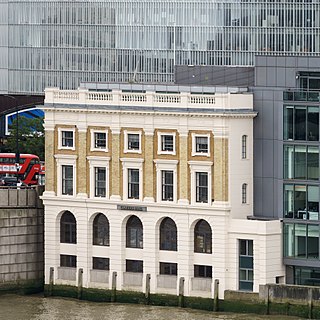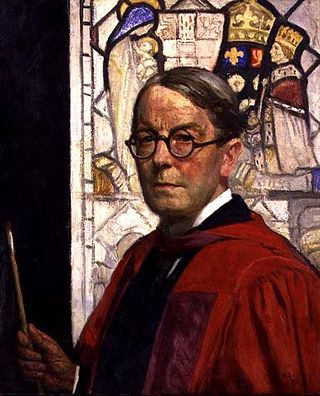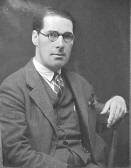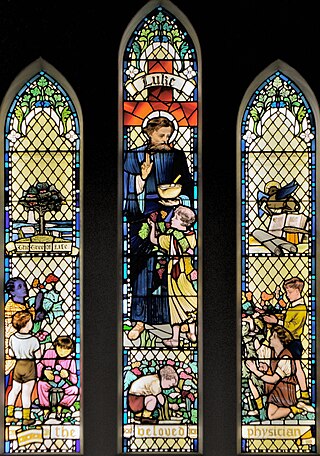Related Research Articles

Stained glass is colored glass as a material or works created from it. Although, it is traditionally made in flat panels and used as windows, the creations of modern stained glass artists also include three-dimensional structures and sculpture. Modern vernacular usage has often extended the term "stained glass" to include domestic lead light and objets d'art created from foil glasswork exemplified in the famous lamps of Louis Comfort Tiffany.

The Worshipful Company of Painter-Stainers is one of the livery companies of the City of London. An organisation of painters of metals and wood is known to have existed as early as 1283. A similar organisation of stainers, who generally worked on staining cloth for decorative wall hangings, existed as early as 1400. The two bodies merged in 1502; the new organisation was incorporated under a Royal Charter in 1581.

The Worshipful Company of Glaziers and Painters of Glass is one of the livery companies of the City of London. The Guild of Glaziers, or makers of Glass, the company's forerunner, existed as early as the fourteenth century. It received a royal charter of incorporation in 1638. It is no longer a trade association of glass craftsmen, instead existing, along with a majority of livery companies, as a charitable body.

A house painter and decorator is a tradesperson responsible for the painting and decorating of buildings, and is also known as a decorator, or house painter. The purpose of painting is to improve the appearance of a building and to protect it from damage by water, corrosion, insects and mould. House painting can also be a form of artistic and/or cultural expression such as Ndebele house painting.

Sir William Blake RichmondPPRBSA was a British painter, sculptor and a designer of stained glass and mosaic. He is best known for his portrait work and decorative mosaics in St Paul's Cathedral in London.

Carl Almquist was a Swedish-born stained-glass artist whose professional life was spent entirely in Britain. He was a pupil of Henry Holiday and became one of the two chief designers for the well-known Lancaster firm of Shrigley and Hunt. He was in large measure responsible for establishing their late Pre-Raphaelite or Aesthetic style. Though largely neglected by 20th-century art historians he has more recently been acclaimed as a genius, and as one of the leading late-Victorian stained-glass designers.

A revival of the art and craft of stained-glass window manufacture took place in early 19th-century Britain, beginning with an armorial window created by Thomas Willement in 1811–12. The revival led to stained-glass windows becoming such a common and popular form of coloured pictorial representation that many thousands of people, most of whom would never commission or purchase a painting, contributed to the commission and purchase of stained-glass windows for their parish church.
The firm of James Powell and Sons, also known as Whitefriars Glass, were London-based English glassmakers, leadlighters and stained-glass window manufacturers. As Whitefriars Glass, the company existed from the 18th century, but became well known as a result of the 19th-century Gothic Revival and the demand for stained glass windows.

Clayton and Bell was one of the most prolific and proficient British workshops of stained-glass windows during the latter half of the 19th century and early 20th century. The partners were John Richard Clayton (1827–1913) and Alfred Bell (1832–1895). The company was founded in 1855 and continued until 1993. Their windows are found throughout the United Kingdom, in the United States, Canada, Australia and New Zealand.

Burlison and Grylls is an English company who produced stained glass windows from 1868 onwards.

Christopher Whitworth Whall was a British stained-glass artist who worked from the 1880s and on into the 20th century. He is widely recognised as a leader in the Arts and Crafts movement and a key figure in the modern history of stained glass.

Eleanor Fortescue-Brickdale was a British artist, a late exponent of Pre-Raphaelitism. She produced paintings in oils and watercolour, book illustrations, and a number of designs for works in stained glass.

Robert Anning Bell was an English artist and designer.
Lilian Josephine Pocock (1883–1974) was a stained glass artist who provided stained glass for a number of buildings, including Ulverston Victoria High School, The King's School and Ely Cathedral. She was also a theatrical costume designer, book illustrator and watercolourist. In her later years, failing eyesight prevented her from continuing her work in stained glass. After some years of retirement she died in 1974.

James Humphries Hogan RDI FSGT FRS was an English stained glass designer with the firm of James Powell and Sons throughout his career, rising from apprentice to be managing director of the company. He made magnificent stained glass for many of England's cathedrals, including the 100 feet high central windows of Liverpool Cathedral.

Percy Bacon and Brothers was a firm which produced stained glass, church furnishings, and decorations. The firm was set up in 1892 by stained glass artist and sculptor, Percy Charles Haydon Bacon, and operated for many years from 11 Newman Street, London. He was joined there by his brothers, Herbert W. Bacon, and Archibald Arthur Bacon. The vast majority of the firm's output of stained glass was installed in Great Britain, with a few examples in Northern Ireland and the Republic of Ireland, but their work can also be found in the United States of America, Australia, New Zealand, and Canada.

Gertrude Alice Meredith Williams, who generally went by the name of Alice Meredith Williams, was a British sculptor, painter, illustrator and stained glass designer.

The Knox Guild of Arts and Crafts was formed in 1912 by a group of about twenty art students at Kingston School of Art, Surrey, England in honour of the Liberty designer Archibald Knox. Knox had resigned from his post as Head of Design at Kingston School of Art in 1912 following criticism of his teaching. Knox was officially the Master of the Guild, although by then he had returned to the Isle of Man. He did however return and exhibited with them. They rented rooms at 24A Market Place, Kingston, until about 1914. They followed Knox's mantra Aim for order, hope for beauty.
Kathleen Quigly was an Irish stained glass artist, illustrator and painter. She was also a metal worker and jewellery designer.
Leonard Walker was a British painter and stained glass designer. His work was part of the painting event in the art competition at the 1928 Summer Olympics.
References
- ↑ "British Society of Master Glass Painters - entry on the Building Conservation Website". Buildingconservation.com. Retrieved 22 May 2017.
- ↑ Fisher, James (2023-05-24). "Stained-glass makers in danger of disappearing from Britain — is there time for a renaissance?". Country Life. Retrieved 2024-01-13.
- ↑ Memorandum and Articles of Association of the British Society of Master Glass Painters, 1921; p10
- ↑ "British Society of Master Glass Painters / Organisations / Craft Directory / Crafts Council". Archived from the original on 2011-07-27. Retrieved 2010-10-15.
- ↑ "BSMGP Council Officers and Members - BSMGP | The home of British Stained Glass". BSMGP. Retrieved 2025-01-23.